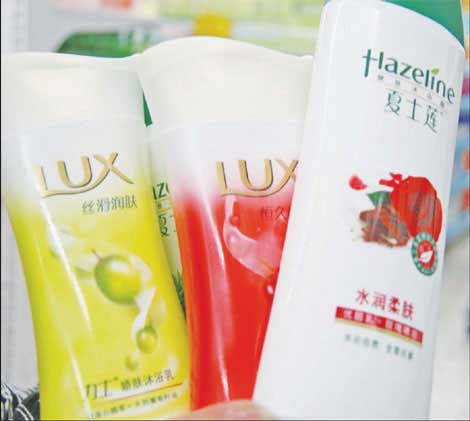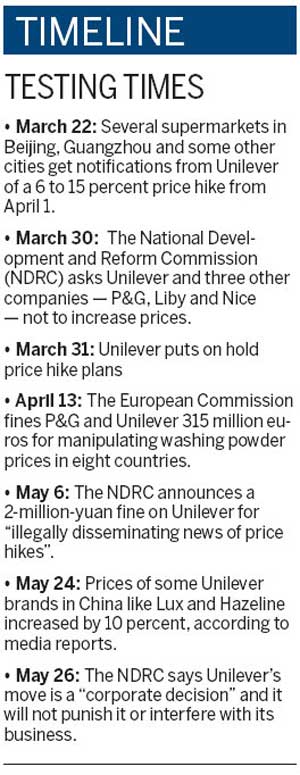Companies
Inflation control vs market forces
Updated: 2011-06-03 10:58
By Hu Haiyan and Yan Yiqi (China Daily European Weekly)
 |
|
Unilever's body lotion on shelf at a supermarket in East China's Jiangsu province. The company raised prices of some products late last month. Provided to China Daily |
Unilever case may prompt government to take fresh approach on price controls for consumer goods
Anglo-Dutch consumer goods giant Unilever's decision to hike product prices in the wake of a government fine may prompt the Chinese government to rethink price controls on some consumer goods in the fight against inflation, experts say.
When Unilever announced in March that it planned to increase prices from April 1, the National Development and Reform Commission (NDRC), China's top pricing watchdog, stepped in and asked the company not to hike prices.
Unilever announced in late March that it would suspend the price-hike plans. But the NDRC on May 6 imposed a fine of 2 million yuan (214,300 euros) on Unilever, saying that the company's planned price hikes contributed to the inflationary expectations and triggered panic buying.
But Unilever raised the prices of some products late last month, three weeks after the fine.
"Unilever's move is to test the water and to test the bottom line of the government," says Zuo Xiaolei, chief economist at ChinaGalaxySecurities.
"When it feels the 2-million-yuan fine is all that the government can do, the company has nothing to fear."
Unilever's actions, however, effectively boost its sales in the short term and make it better-known in the market, says Li Jianan, an analyst specializing in the chemical industry at CIConsulting. "Their moves look like a public relations show to some extent," Li says.
On May 26, the NDRC said that Unilever's 10 percent price hike on some of its products is a "corporate move" and the government will not interfere with the market.
 |
The NDRC remark showed that the Chinese government has realized that price-control orders cannot work, says Xi Jinghan, head of research at consultancy firm Zhengdian International, who has been studying the household and personal care market for more than a decade.
"That is a positive sign that the government is awakening from its reliance on price controls," she says.
The Chinese government typically asks consumer goods makers not to increase prices as a way to check inflation. Earlier this year, it made similar requests to producers of instant noodles, cooking oil and pork.
"The government's intention is good. It is to tame runaway inflation," says Luo Jiexin, an independent financial analyst and business consultant in Shanghai.
China's inflation reached 5.3 percent in April, well beyond the government's full-year target of keeping the consumer price index below 4 percent.
"I don't think price control, a legacy of the planned economy, works well," Luo says.
"Unilever's price hikes reflect the drawbacks of administrative measures," Luo says.
The market-oriented measures, according to Luo, include draining liquidity, improving infrastructure, reducing logistics costs, aiding vulnerable groups and punishing price manipulators.
A People's Daily editorial dated May 27 urged the government to "inject more market-oriented forces" to handle price increases. "Only by creating more competition in the industry can the prices be automatically maintained at reasonable levels. That is the major responsibility of the regulator," it says.
"The government should encourage more private companies to enter the household care market and nurture homegrown companies to rival monopolizers," it says, without naming them.
Unilever and P&G declined to comment on any questions related to prices.
Liby Group, China's largest homecare product maker that is a rival to Nice Group, Unilever and P&G, say that it has no plan to increase prices for the time being.
"We will try to control the costs through economics of scale and internal streamlining," says Xu Xiaodong, Liby's spokesman.
The four companies accounted for between 70 and 80 percent of China's household and homecare product market.
Specials

Room at the inn
The Chinese hotel industry experiences a building boom, prompting fears of oversupply.

Pearls of wisdom
Chinese pearl farmers dominate the world market but now want to work smarter, not harder

Truly a super woman
Li Yuchun first came to prominence in 2005 as the Super Girl winner, and since then has become an international star.